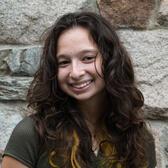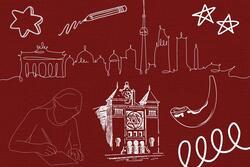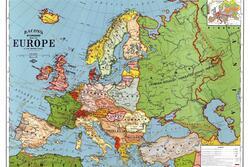Being Jewish in the UK at Christmas
My parents told me we were moving to the UK in the summer of 2015, for my fifth grade year, to a diverse, multicultural city so completely different from the Bible Belt town I’d grown up in. I was completely ecstatic – excited to meet people who thought more like I did, and ready to escape the Southern Baptist hegemony I lived in. Yet, I’ve never felt more isolated in being Jewish than I did while living and going to school in England.
I don’t think I quite realized how deeply Christian the English state school system would be. My parents purposely chose a non-Church of England affiliated school for me in an attempt to keep my education secular. But at my school, we had weekly, extracurricular Christian assemblies, where the elementary-age kids would act out stories from the Bible. We’d file into the gym and sit on our long, wooden benches and watch eight-year-old Jesus in a felt costume. They wouldn’t let me skip the assemblies, either; the only assemblies we could skip were the ones where Christian rock groups came to play. All of the non-Christian kids would sit in the library and awkwardly look around, hearing the echoes of worship music, adding to the atmosphere of isolation.
Come Christmastime, a season during which I’ve always felt left out, the school announced its plans to have its annual Christmas dinner. The pre-Christmas festive mood was high, but I wasn’t feeling it. Naturally, the school administration decided the best way to celebrate Christmas 2015 was to make all of the students sing Christmas carols. I cried. Nobody understood why I was crying about having to sing Christmas carols. Primary school Christmas dinners are a celebrated tradition in the UK, with the fond memories of Christmas crackers and roast dinner being nostalgic for many Brits. For me, they were just another sign that I was different from everybody else.
In the US, I live in Arkansas – not exactly a pinnacle of religious diversity. I, however, had never been exposed to school-sponsored explicitly religious events like I was when I lived in England. Our Christmas parties were always winter parties, and we would at least talk about Hanukkah and Kwanzaa. Our spring break was always called “spring break” – never Easter break. And, most importantly, there were never any required Christian assemblies. Institutionally, I’ve never felt isolated for being Jewish in the United States. Though I know it’s not everyone’s experience, the feelings of difference that accompanied my Jewishness back home were almost always inflicted by other kids, not by the schools and government itself. In England, where kids tended to be more accepting, I felt different because of the school as an institution – not the student body.
For me, the institutional isolation felt much worse than the interpersonal isolation. In England, I felt as though the people I was supposed to trust to make me feel welcomed in a safe educational environment did not acknowledge my identity. It seemed as though the school itself attempted to marginalize religious minorities, and a place that was supposed to support me instead brushed away my right to practice my religion. The interpersonal isolation stateside was tough, mostly because I couldn’t relate to other students. The school itself always tried to make the voices of religious minorities heard, teaching the kids in my classes about Jewish holidays and keeping many of the winter-themed parties completely secular. I didn’t realize how much more included I felt having secular winter parties instead of Christmas parties until I was in England.
The Christmas carols and church-themed assemblies went directly against my right to freedom of religion, and are a clear example of blending church and state. The inseparability of religion and culture in the UK shocked me. Looking back on it, it’s very odd to me how in a country where freedom of religion is a protected right, and in a city that was distinctly more culturally diverse than the Bible Belt town I’m from, I felt the most isolated for being Jewish.
The United States has freedom of religion as one of its founding principles; the UK, on the other hand, slowly developed it through a gradual process of secularization. This leaves distinct remnants in its culture: around 25% of primary schools are Church of England affiliated and the monarch must be married to a Protestant. Almost all shops are closed on Sundays, and my non-Church of England affiliated primary school still hosts religious assemblies. In the UK, religious schools can be state funded. All of these facts come as a shock to Americans, who take for granted the default secularization of public institutions and are more conscious of religious invasion in government. The United States is much more religious than Western Europe, and yet in many ways, it has a much more secular culture.
I loved the time I spent in England, but I would’ve enjoyed it more had my school attempted to create a more diverse, welcoming, and not Christian-centric environment. In England, secular parties and festivals to celebrate the coming of winter wouldn’t necessarily have to change much tradition, but would instead make students coming from religious minority backgrounds feel much more accepted and welcomed. Religious assemblies could be replaced with secular assemblies that emphasize the same morals. Being welcoming is an easy change – and one I think we can all hope that more schools will implement in the future.
This piece was written as part of JWA’s Rising Voices Fellowship.








My husband and very young children lived in Peterborough, UK from 1992-93. We were fortunate to live in a city with a very small Jewish community, which warmly welcomed us. Kudos to Irene for skillfully describing her experience and the unpleasant challenges her school created, lacking sensitivity to her identity. The Peterborough community had few school aged children. Not sure if these children had the same experience.
A branch of my mother’s family left Poland for Sheffield, UK, before WW2. The children of this family attended a boarding school. I visited their home in Dec1975 and noticed a large, beautifully decorated seasonal tree in the entry hall. I was asked if my parents had a similar tree; I responded no.
I share these anecdotes to expand upon Irene’s recent experiences.
Our Peterborough neighbors knew we are Jewish and warmly welcomed us. Maybe the community is the factor to consider to explain this blatant lack of awareness of a diverse world.
My recollection of King Charles III’s coronation and his visit to the Jewish community in a London neighborhood both reveal increasing acknowledgement of Jews as members of the UK. As we see elsewhere in the world, such acknowledgement and acceptance may not trickle through all members of the community or society.
Hoping our internet voices provoke this trickle. Thank you!
What a moving, insightful and also kind of sad piece. Thank you for your thoughtful honesty! It makes me appreciate things we sometimes take for granted here.
I LOVE IRENE!!! BEST WRITER ON DA INTERNET